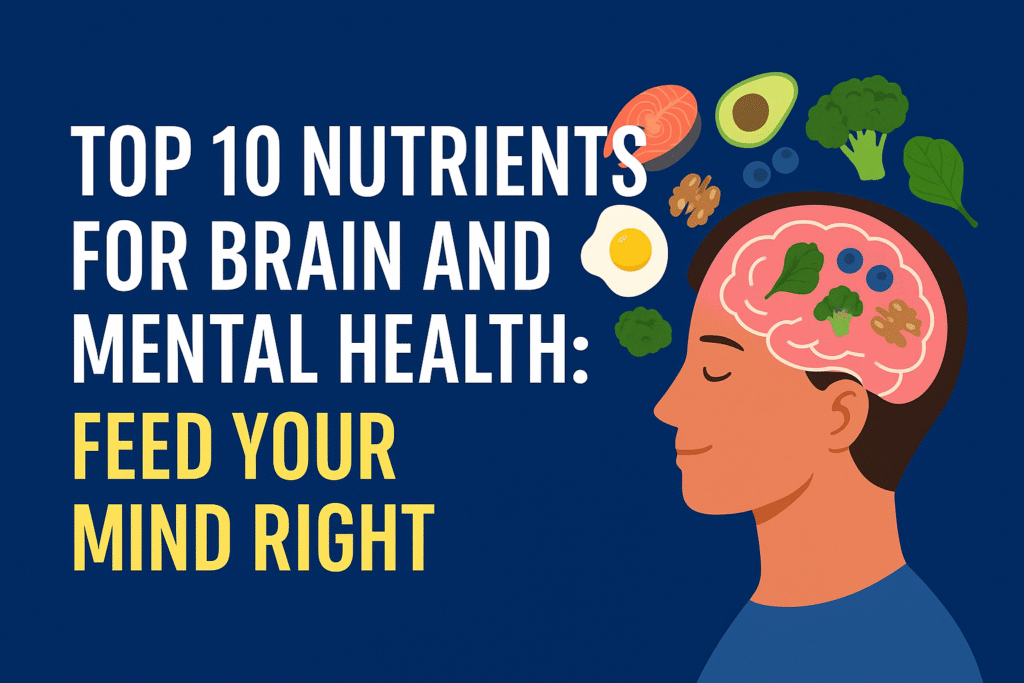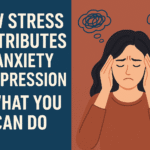Your brain is the command center of your body. It controls your thoughts, emotions, memory, decisions – even your heartbeat. But like every organ , it needs fuel. Just like an athlete needs the right diet to perform, your brain needs the right nutrients for optimal function and mental wellness.
So , what are the top nutrients for brain and mental health, and how do they work? Let’s dig in!
1. Omega-3 Fatty Acids – The Brain’s Building Blocks
Omega-3s, especially DHA (docosahexaenoic acid), make up nearly 60% of your brain’s dry weight. These healthy fats:
- Support neuronal growth and repair
- Improve communication between brain cells
- Lower the risk of depression, bipolar disorder, and Alzheimer’s disease
Best sources: Fatty fish (salmon, mackerel, sardines), chia seeds, walnuts, flaxseeds
Tip: Eat oily fish twice a week or take algae-based omega-3 supplements if you’re vegetarian.
2. Vitamin B Complex – Brain Metabolism Boosters
The B vitamin family (B1 to B12) helps your brain create energy, produce neurotransmitters, and process glucose. Deficiencies can lead to:
∆ Poor memory
∆ Brain fog
∆ Mood swings and irritability
Key players:
B6: Helps make serotonin and dopamine
B9 (Folate): Crucial for brain development
B12: Prevents brain shrinkage and improves cognitive function
Sources: Whole grains, leafy greens, eggs, meat, lentils
3. Vitamin D – Mood and Memory Regulator
This hormone-like vitamin plays a key role in brain cell growth and inflammation control. Low levels are linked to:
∆ Seasonal affective disorder (SAD)
∆ Depression
∆ Poor concentration and memory
Sources: Sunlight (15-20 min daily), fortified milk, mushrooms, fatty fish
Fun fact: Vitamin D receptors exist in parts of the brain responsible for mood regulation.
4. Magnesium – Nature’s Anti-Stress Mineral
Magnesium supports the nervous system and regulates brain signals. It helps prevent overstimulation of neurons, which can lead to anxiety and even migraines.It also improves sleep, which is when the brain performs most of its memory consolidation and repair.
Sources: Almonds, spinach, dark chocolate, avocado, beans
Supplement tip: Magnesium glycinate or citrate is best absorbed by the body.
5. Iron – Oxygen and Energy Provider
Iron helps red blood cells transport oxygen to the brain. Low iron = low oxygen = brain fatigue.Children, women of reproductive age, and vegetarians are more at risk for iron deficiency, which can lead to:
∆ Reduced attention span
∆ Mental sluggishness
∆ Learning difficulties
Sources: Red meat, spinach, tofu, legumes, fortified cereals
Pro tip: Pair iron-rich foods with vitamin C (like oranges or tomatoes) to enhance absorption.
6. Zinc – Memory and Learning Enhancer
Zinc is involved in neurotransmitter signaling, neurogenesis, and synaptic plasticity (how well your brain adapts and learns). A deficiency may contribute to:
∆ Attention issues
∆ Depression
∆ Slower cognitive processing
Sources: Shellfish, pumpkin seeds, chickpeas, cashews
Supplement caution: Don’t overdo zinc – high doses can interfere with copper absorption.
7. Choline – The Memory Molecule
Choline is a lesser-known but powerful nutrient. It’s the precursor to acetylcholine, a neurotransmitter vital for:
∆ Short- and long-term memory
∆ Focus and learning
∆ Brain development in the womb
Sources: Eggs (especially yolks), soybeans, liver, quinoa
Did you know? Pregnant women need extra choline to support fetal brain development.
8. Antioxidants – The Brain’s Shield
Free radicals are unstable molecules that can damage brain cells. Antioxidants neutralize them, keeping your brain young and healthy.Key antioxidants for brain health:
∆ Vitamin C: Improves memory and mental agility
∆ Vitamin E: Protects neurons from oxidative damage
∆ Polyphenols: Found in green tea, berries, and dark chocolate
Sources: Blueberries, strawberries, turmeric, cocoa, green tea
9. Amino Acids – Neurotransmitter Builders
Protein-rich foods provide amino acids like tryptophan and tyrosine, which are building blocks for:
∆ Serotonin (happiness)
∆ Dopamine (motivation)
∆ Norepinephrine (alertness)
Sources: Eggs, poultry, dairy, tofu, nuts, legumes
Fun fact: Low tryptophan levels have been linked to depression in clinical studies.
10. Probiotics – Gut Health = Brain Health
The gut-brain axis is a communication network between your digestive system and your brain. A balanced gut microbiome helps:
∆ Regulate mood
∆ Reduce anxiety
∆ Improve cognitive performance
Sources: Yogurt, kefir, kimchi, sauerkraut, miso
Scientific note: Gut bacteria produce neurotransmitters like GABA and serotonin.
Real-Life Application: Creating a Brain-Boosting Meal Plan
Here’s a sample one-day meal plan using all 10 nutrients:
Breakfast: Oatmeal with chia seeds, walnuts, and blueberries (omega-3s, antioxidants, B vitamins)
Lunch: Grilled salmon with quinoa and steamed spinach (omega-3s, iron, choline, magnesium)
Snack: Yogurt with a drizzle of honey and pumpkin seeds (probiotics, zinc)
Dinner: Stir-fried tofu with broccoli and brown rice (amino acids, vitamin B complex, iron)
Drink: Green tea with lemon (antioxidants, vitamin C)
You can always refer to a professional dietician to create a good meal plan for you.
FAQs on Brain and Mental Health Nutrition
Q1. Can poor nutrition cause mental illness?
Yes. Nutrient deficiencies – especially in B vitamins, omega-3s, and vitamin D – are strongly linked to depression, anxiety, ADHD, and cognitive decline.
Q2. How soon can I see mental benefits from improving my diet?
Improvements in focus, energy, and mood can be noticed in 2-4 weeks. Long-term brain health benefits (like memory protection) require consistent nutrition.
Q3. Are supplements as effective as food sources?
Food-based nutrients are better absorbed and come with fiber and phytochemicals. Supplements should only be used when prescribed or if dietary gaps exist.
Q4. Which is the single most important nutrient for brain health?
There isn’t just one. However, omega-3 fatty acids and vitamin B12 are widely considered foundational for both structure and function of the brain.
Q5. Can children benefit from these brain nutrients?
Absolutely. Children need these nutrients for proper brain development, focus, emotional regulation, and learning. Avoid processed, sugar-heavy diets.
Your brain is an energy-hungry organ and feeding it the right nutrients can transform your life. From memory and focus to mood balance and emotional resilience, your plate holds the power.If you’re looking to improve mental clarity, prevent cognitive diseases, or just feel more like yourself again, these top 10 brain health nutrients are the place to start.
Eat smart, think smart, and live smart – because a healthy mind is your greatest asset. To know more, click here

